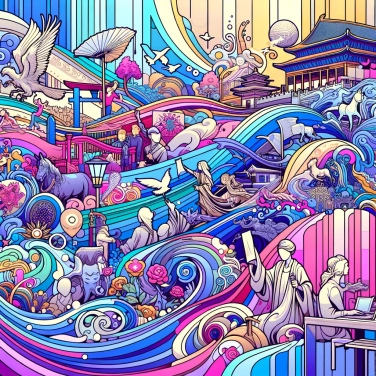Julius Caesar was obsessed with his image and appearance due to the culture of ancient Rome, which placed great importance on the public representation of leaders, symbolizing their power and social status. Caesar sought to present himself in an imposing manner to reinforce his authority and legitimacy among the people and his supporters.

In Rome, appearance was a strong symbol of wealth, social success, and personal power. Wearing well-tailored clothes and displaying a confident posture sent a clear message about your status. Among the Roman elite, attire, hairstyle, and even gait were subtle (but effective) ways to remind others who was in charge. Caesar was no exception: in his time, being well-dressed and having an impeccable appearance was a way to demonstrate one’s authority and respectability. If you wanted to be taken seriously in Rome, it was better to pay attention to your look and how others perceived you.
In Rome, everything revolved around the public image: if you wanted to lead, you had to show that you had the class and authority that came with it. Julius Caesar understood this well: his look, his outfits, even his hairstyle were integral parts of his political strategy. He paid particular attention to details to display his status as a leader. His famous laurel crown, for example, clearly symbolized victory and supreme command. For him, being stylish was a way to send a message to opponents and the people: he was the boss, and he intended to stay that way.
Caesar was a pro at using the arts to control his image. He had idealized statues made, depicting him as a young hero, even at an advanced age. The guy always appeared handsome and strong, like a demigod to make an impression. His recognizable profile was also found on coins, so that everyone knew who was in charge. Through these representations, Caesar portrayed himself as a legendary figure, skillfully filtering what the people saw of him and enhancing his personal prestige.
Julius Caesar uses his military victories to build a heroic reputation. With each victory, he spreads epic tales, making his exploits famous in Rome. With his soldiers, he carefully cultivates his image as a competent, approachable, and charismatic leader. After the conquest of Gaul, Caesar publishes his accounts (Commentaries on the Gallic War) to propagate his glorious image, amplifying his popularity. This skillful media strategy gradually leads to a true cult of personality in Rome, a blend of national admiration and almost religious respect. In this way, Caesar captures the sympathy of the Roman people, impressed by this victorious and constantly triumphant general.
The laurel crown worn by Caesar was more than just a symbol of prestige: it actually served to subtly conceal his balding head while asserting his victorious image.
Did you know that Julius Caesar had coins struck with his likeness to spread and reinforce his image throughout the Roman Empire? It was a true ancient marketing strategy!
According to the historian Suetonius, Caesar particularly enjoyed wearing robes with carefully decorated fringes, which enhanced his prestige and attracted the attention of the Roman public during official appearances.
While appearance and physical presence were essential in Roman culture, Caesar particularly cultivated his charisma, which was said to influence even his most steadfast political opponents.
César meticulously ensured his public reputation by using coins engraved with his likeness, idealized artistic representations, and grand celebrations that affirmed his popularity and political authority.
In ancient Roman society, physical appearance reflected social status, moral character, and authority. Taking care of one's appearance was therefore essential to gain respect, social influence, and public recognition.
Caesar's military victories enhanced his personal prestige, fueling the creation of a genuine cult around his figure. He used his successes to promote his image as an invincible hero and protector of Rome.
The image of Caesar is primarily conveyed to us through statuary, busts, coins minted in his likeness, and some historical writings documenting his life, appearance, and public behavior.
Caesar was attentive to various aspects of his appearance, such as his carefully styled hair to conceal the onset of baldness and the use of distinctive clothing like the purple toga, a symbol of power and prestige.

No one has answered this quiz yet, be the first!' :-)
Question 1/5